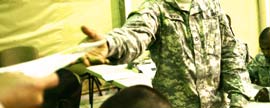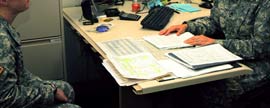Introduction
We have numerous tools at our disposal to correct substandard performance. Soldiers who are immature, lack discipline, or simply fail to follow instructions need your help. Two methods are explained in this chapter; Corrective Training and Revocation of Privileges. Both of these are techniques used by proactive leaders to get a Soldier’s attention and set them on the right path.
Commanders, unit leaders, and noncommissioned officers (NCOs) must deal with a broad spectrum of misconduct. The most serious cases are crimes familiar to a civilian society and serious military offenses, such as homicides, assaults, drug-related offenses, and desertion. Less serious civilian and military offenses are loosely described as minor offenses. The least serious are insignificant acts of misconduct that may not even rise to the level of an offense. These may be addressed without the necessity of punishment.
When a Soldier commits an offense, you have a wide variety of options. Each option has its own attributes and values. When considering corrective action for misconduct, use the least severe measure that will accomplish your goal. Your choice will depend in part on the severity and nature of the misconduct, coupled with your intended goal in addressing the misconduct. Punishment generally has one or more of the following goals:
- To protect society against a repetition of the offense.
- To reform the offender so he will not repeat the offense.
- To deter others from considering and committing such an offense.
Minor offenses may justify nonjudicial action under Article 15, UCMJ. Imposition of punishment under Article 15 procedures is restricted to a Commander. Your options for less significant misconduct can be loosely collected under the title of adverse administrative actions.
Corrective training should emphasize correcting misconduct and improving Soldier performance. The majority of Soldier misconduct does not result from intentional or gross failure to comply with standards of military conduct. Instead, misconduct results from simple neglect, forgetfulness, ignorance, laziness, inattention to instruction, sloppy habits, immaturity, and difficulty in adjusting to the disciplined military life. Implicit in adverse administrative actions is the belief that the offender can, with proper guidance, become an efficient and competent Soldier.
In dealing with less significant acts of misconduct, you have an excellent opportunity to salvage good Soldiers and to teach young Soldiers the errors of their ways without imposing a penalty that they may never overcome. Many of the procedures available permit you to deal with this type of misconduct without requiring a formal report. You can thus correct Soldiers and allow them to return to duty, sometimes without serious blemish to their record as would happen if they were subjected to non-judicial punishment.
In these instances, you primarily teach discipline and standards of conduct while refraining from punishment that is restricted to a Commander. This is a fine but crucial line. If you seek to punish, you should consider an Article 15 or court-martial; if you primarily seek to teach, coach, mentor, train then you should consider corrective training.
Wise use of corrective training frequently results in the Soldier adjusting and improving their conduct so that they do not ultimately become a candidate for judicial action, Article 15 action, or administrative separation or reduction. In some instances, however, judicial or non-judicial punitive measures are immediately appropriate. One of the tests of a good leader is to determine correctly which measure or combination of measures is appropriate for a particular Soldier at a particular time.
Corrective Training
Corrective training has the capability to correct substandard performance for minor infractions without damaging the Soldier’s official record. It also tends to get the Soldier’s attention quickly. Corrective training is also referred to as non-punitive measures. The procedures for corrective training are outlined in AR 27-10 (Military Justice), AR 600-20 (Army Command Policy), FM 7-22, and FM 27-1. Most JAG offices also offer a local Commander’s legal guide that can answer many common legal questions. Do not confuse non-punitive measures, which are corrective in nature, with non-judicial punishment administered under the Uniform Code of Military Justice (UCMJ).
What is Corrective Training?
Corrective training (also referred to as extra training or remedial training) is the inherent and legal authority (backed by Article 91 (NCO) and Articles 89 & 90 (Officer) UCMJ) granted to leaders to correct substandard performance by subordinates as a result of simple neglect, forgetfulness, laziness, inattention to instruction, sloppy habits, immaturity, and difficulty adjusting to military life. Corrective training must be directly related to an observed deficiency and it must be oriented towards improving the Soldier’s performance in the problem area.
What is the difference between Corrective Training and Extra Duty?
Corrective training is not punishment and should not be confused with extra duty imposed as punishments under Article 15, UCMJ. Extra duty need not be related to the Soldier’s misconduct and must be performed after normal duty hours whereas corrective training may be performed during or after normal duty hours.
TIP: Give a substandard performer responsibility for something and hold them accountable. 95% of the time, they will surprise you with exceptional results.
For More Information on corrective training read the Mentor
FaceBook/Twitter/Newsletter
Please follow us and sign up for our newsletter
Facebook: https://www.facebook.com/MentorMilitary/
Twitter: https://twitter.com/AskTOP
Newsletter: http://eepurl.com/bjcYH
Hope you enjoyed this week’s article
TOP














